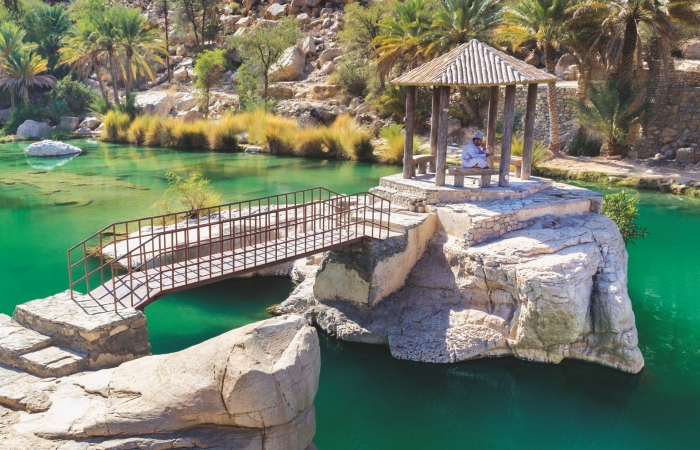With one of the most vibrant cultures, Oman exudes a unique and exotic vibe from the rest. As oldest independent state in the Arab World, the country has embraced modernisation and progress while retaining the core aspects of its culture and heritage – making it the perfect travel destination for those seeking an authentic Arabian experience.
Janice Alyosius
Wadi Bani Habib
Wadi Bani Habib is a picturesque abandoned village in Jebal Akhdar, Oman. The village of Wadi Bani Habib on the slopes of Jebal Akhdar is an example of Omani architectural style. Architectural patterns express the cultural details of the country and its society. Omani lanes (Harat), built centuries ago, demonstrates their distinguished way of building. These avenues are built of mud, stones and plaster, and the designs of their doors and windows vary in bright colours that make them exceptionally aesthetic. According to official statistics, these structures are more than a thousand years old and found mainly in the administration of Nizwa and Al Hamra.
Nizwa Fort
Among the many attractions of Oman, Nizwa Fort and its souk are perhaps one of the most popular tourist attractions in Oman due to its historical significance, socio-economic role and architecture. Originally built in the 9th century and later renovated by Sultan Al Yaribi in the 17th century, the fort’s designs are based on cannon warfare. Probably the best place for anyone who wants to explore what Oman was like in the olden days, Nizwa Fort is an example of how life in the villages outside the capital still remains somewhat intact. Nizwa is about an hour from Muscat and can be done as a day trip to visit the Nizwa Souk.
Wahiba Sands
The mighty sands of Wahiba, also known as the Sharqiya Sands, is an ocean of sand dunes that stretch endlessly. Named after the Wahiba Bedouin nomadic tribes, this desert region is famous for its amber coloured sands and massive sand dunes, some of which are up to 100 metres high and cover more than 10,000 square kilometres. The most popular activities in the Wahiba Sands are dune bashing and camel safari. Camping in the Wahiba Sands is a heavenly experience and visitors to these camps can experience various activities. Light pollution doesn’t din the stars here, and stargazing is a popular activity after sunset. Just three hours from Muscat, an overnight stay here offers an easy way to experience the power of the desert from the comfort of a luxury camp.
Ras Al Jinz Turtle Reserve
One of the most popular ecotourism activities in Oman is turtle watching and trekking. Ras Al Jinz Beach is famous for the endangered green turtle and is probably the most important nesting centre in the Indian Ocean. It is the only official place where the public can watch the unique nesting process of these amazing sea giants, and therefore it has a great impact on Oman’s tourism. Ras Al Jinz Center conducts guided tours every night to see the turtles and witness their nesting process. The best time to see the turtle hatching in Oman is during the summer months of May to September.
Wadi Bani Khalid
The Sultanate of Oman has a wadi which serves as a destination for tourists, called Wãdì Banì Khãlid, which is located about 203 km from Muscat and 120 km from Sur. Wadi Bani Khalid is famous for its large pools of emerald water surrounded by tall palm trees. Unlike other wadis in Oman, which dry up during the summer months, Wadi Bani Khalid have a constant flow of water throughout the year. The rocky canyon and cliffs of Hajar mountains make it breathtakingly beautiful and often referred to as a “desert paradise”. Wadi Bani Khalid, located at the end of Bada village, is one of the most popular holiday destinations in the Sultanate. It is both a magical canyon oasis and a family park.
Sinkhole
Hawiyyat Najm known as Bimmah Sinkhole in English, is a water-filled depression that is structurally a well in limestone in the eastern province of Muscat, Sultanate of Oman. Bimmah Sinhole is only 1.5 hours from Muscat and 55 minutes from Sur. Unlike other activities in Oman, Bimmah Sinkhole is extremely easy to reach as there is no hiking or long drives involved. It is next to the main street and easy to walk. It is a picturesque water-filled depression and an ideal day trip from the capital city of Muscat. Although the sinkhole was formed through years of rock erosion, local legends believes that the swimming hole replaced a cavern that was created when a meteorite hit the spot. As a result, the Bimmah Sinkhole was named Hawiyyat Najm, or The Falling Star, by the Omani locals. A large concrete staircase leads all the way from the rock precipice to the pool. Although most people travel to the Sinkhole just to admire its beauty, the swimming hole is perfect for a quick dip.
 TravTalk India Online Magazine
TravTalk India Online Magazine





